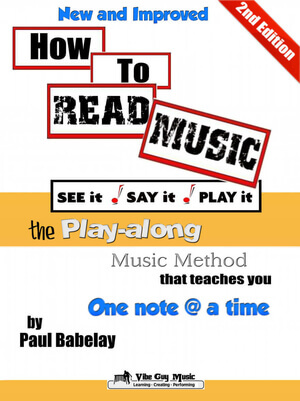A Word to the Wise
Learning how to read music is fun, rewarding and valuable. But no matter what you’ve seen on advertisements – it takes longer than 15 minutes. Be patient.
It’s easy to start something new and expect great results overnight.
In college, I studied German for three semesters. Our professor spoke 7 languages, had travelled the world and was a brilliant teacher. But as fabulous as he was, I was still lazy.
I wasn’t lazy in music studies, but German was harder to learn than I expected. His brilliance was no match for my excuses, and I was always a mediocre student. Sadly, I could have learned so much more if I had applied myself. Too late now.
Don’t make my mistake.
Do the Work
This course can do much more than teach you to read music notes.
It includes ear training, music theory, notation skills and more. But, as fun and rewarding as this material is, it still will require your time, energy and comittment to succeed.
You’re going to have to work on it. I’m sure you’re smart and know this already.
Also, after the newness wears off, be careful you don’t fall for
New Car Syndrome
This is when you purchase a car with a unique color and model that you’ve never seen before. Nobody has one like it. One of a kind!
But suddenly, everywhere you look there goes another car just like yours.
Likewise, out of nowhere will appear new “how to read music” videos, free webinars, free lessons and shiny new ads that claim “Learn To Read Music in 15 Minutes”….
It’s tempting to believe there are short-cuts and workarounds for learning to read music. There are not.
Be patient.
Keep It Simple
Also, I can’t possibly cover everything about reading music in one course.
If you have tried to read music before, you probably got frustrated at the amount of material you were given to memorize. We don’t do that here.
There are 3 things we will not cover at all:
- Chords
- Key Signatures
- Bass Clef (or any clefs other than Treble clef)
Why?
You don’t need to learn chords, yet. (And piano is best for learning Harmony)
Key signatures are not important to you, yet. (Piano helpful here too, but not a necessity)
Bass clef will be easy to learn later, but not today.
Remember, you’re NOT trying to learn everything about music –
just what is most important today.
Too much information too soon is a recipe for failure.
Master the basics, and you’ll be prepared to launch any direction you want.
You’ve made a great decision to study music. Follow the plan, do the work, and soon you’ll be seeing the benefits of the SEE it, SAY it, PLAY it method.
Click here to go to MODULE 2: Why The Recorder?

